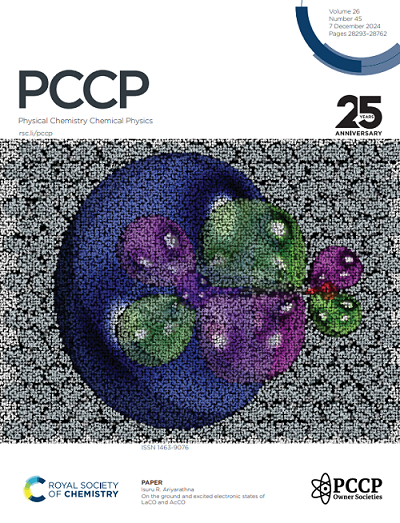Correction: Spin-dependent Seebeck effect in zigzag-edge antimonene nanoribbons
IF 2.9
3区 化学
Q3 CHEMISTRY, PHYSICAL
引用次数: 0
Abstract
Correction for ‘Spin-dependent Seebeck effect in zigzag-edge antimonene nanoribbons’ by Liyan Lin et al., Phys. Chem. Chem. Phys., 2024, 26, 25599–25606, https://doi.org/10.1039/D4CP02713B.
更正:之字边锑纳米带中的自旋依赖性塞贝克效应。
更正林丽燕等人的 "之字边锑纳米带中的自旋依赖性塞贝克效应",《物理化学》(Phys.Chem.Phys., 2024, 26, 25599-25606, https://doi.org/10.1039/D4CP02713B.
本文章由计算机程序翻译,如有差异,请以英文原文为准。
求助全文
约1分钟内获得全文
求助全文
来源期刊

Physical Chemistry Chemical Physics
化学-物理:原子、分子和化学物理
CiteScore
5.50
自引率
9.10%
发文量
2675
审稿时长
2.0 months
期刊介绍:
Physical Chemistry Chemical Physics (PCCP) is an international journal co-owned by 19 physical chemistry and physics societies from around the world. This journal publishes original, cutting-edge research in physical chemistry, chemical physics and biophysical chemistry. To be suitable for publication in PCCP, articles must include significant innovation and/or insight into physical chemistry; this is the most important criterion that reviewers and Editors will judge against when evaluating submissions.
The journal has a broad scope and welcomes contributions spanning experiment, theory, computation and data science. Topical coverage includes spectroscopy, dynamics, kinetics, statistical mechanics, thermodynamics, electrochemistry, catalysis, surface science, quantum mechanics, quantum computing and machine learning. Interdisciplinary research areas such as polymers and soft matter, materials, nanoscience, energy, surfaces/interfaces, and biophysical chemistry are welcomed if they demonstrate significant innovation and/or insight into physical chemistry. Joined experimental/theoretical studies are particularly appreciated when complementary and based on up-to-date approaches.
 求助内容:
求助内容: 应助结果提醒方式:
应助结果提醒方式:


